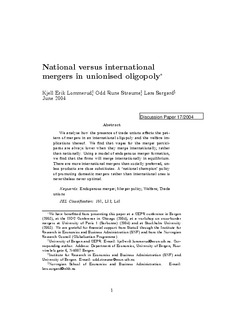| dc.contributor.author | Lommerud, Kjell Erik | |
| dc.contributor.author | Straume, Odd Rune | |
| dc.contributor.author | Sørgard, Lars | |
| dc.date.accessioned | 2006-08-03T07:53:23Z | |
| dc.date.available | 2006-08-03T07:53:23Z | |
| dc.date.issued | 2004-06 | |
| dc.identifier.issn | 0804-6824 | |
| dc.identifier.uri | http://hdl.handle.net/11250/162806 | |
| dc.description.abstract | We analyse how the presence of trade unions affects the pattern
of mergers in an international oligopoly and the welfare implications
thereof. We find that wages for the merger participants
are always lower when they merge internationally, rather
than nationally. Using a model of endogenous merger formation,
we find that the firms will merge internationally in equilibrium.
There are more international mergers than socially preferred, unless
products are close substitutes. A ‘national champion’ policy
of promoting domestic mergers rather than international ones is nevertheless never optimal. | en |
| dc.format.extent | 449966 bytes | |
| dc.format.mimetype | application/pdf | |
| dc.language.iso | eng | en |
| dc.publisher | Norwegian School of Economics and Business Administration. Department of Economics | en |
| dc.relation.ispartofseries | Discussion paper | en |
| dc.relation.ispartofseries | 2004:17 | en |
| dc.subject | endogenous merger | en |
| dc.subject | merger policy | en |
| dc.subject | welfare | en |
| dc.subject | trade unions | en |
| dc.title | National versus international mergers in unionised oligopoly | en |
| dc.type | Working paper | en |
